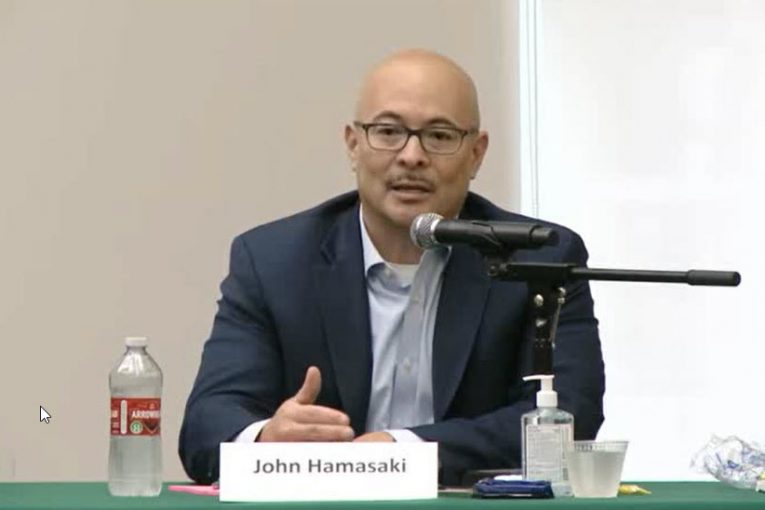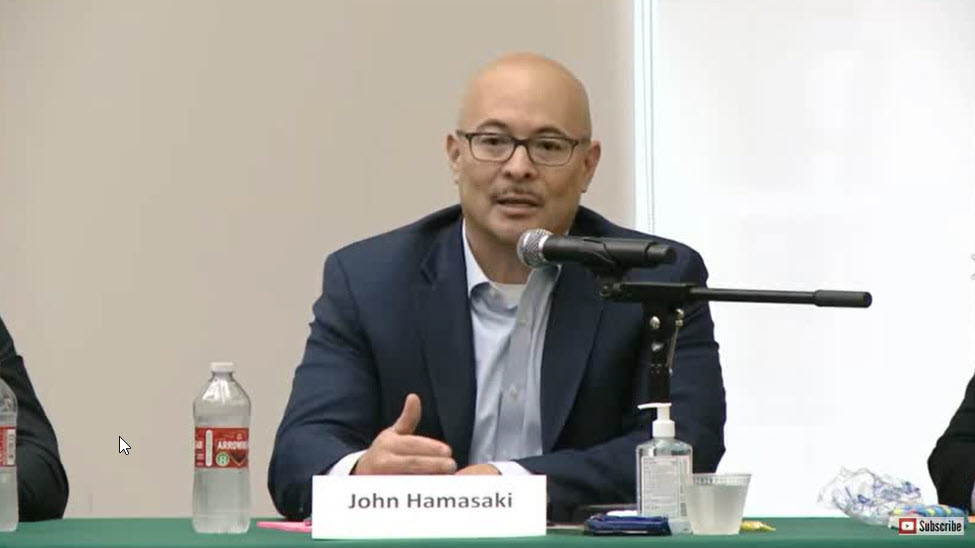

By David M. Greenwald
Executive Editor
San Francisco, CA – Appointed DA Brooke Jenkins has a solid lead over her nearest challenger John Hamasaki—48-34 in first choice votes. With choice voting, if that total holds, that would be sufficient for her to win the District Attorney race in her own right after being appointed by the mayor following Chesa Boudin’s ouster in June.
Jenkins declared victory, noting, “The latest ranked choice voting scenario from the San Francisco Department of Elections shows District Attorney Jenkins easily passing the required 50 + 1% threshold and will likely cruise to victory with over 55% percent of the vote. “
“I extend my thanks and gratitude to the voters of San Francisco for placing their trust in me to serve as District Attorney,” Jenkins said in a statement. “It is an honor of a lifetime to be elected and I pledge that improving and promoting public safety will be my and our office’s top priority.”
She added, “Together, we proved that San Franciscans want accountability and smart reforms in and for our criminal justice system. Together, we proved that we will lead with our City’s progressive values and advance public safety in all of its forms. We will work with city and law enforcement partners to address public safety challenges in every neighborhood that have festered for years with a renewed sense of urgency and purpose.”
But despite the strong statement, her campaign and brief tenure has been marked by controversy and accusations of wrongdoing. A second bar complaint was filed just on Monday after the Mission Local publication reported last week reported that Jenkins sent an email to du Bain’s personal email, with the subject line “Troy McAllister Police Reports.” The email contained three documents including an unredacted police report, while another one contained McAlister’s summary criminal history record, commonly known as a “rap sheet.”
Critically, “Although Jenkins sent the police reports to Don du Bain when they were both still employed as Assistant District Attorneys, neither Jenkins nor du Bain had ever been assigned to the prosecution of Troy McAlister.”
Retired Judge Martha Goldin filed a second bar complaint.
According to the bar complaint, “Penal Code sections 11105 and 13300 make clear that those receiving rap sheets containing criminal information history must have a legitimate and compelling statutory reason for access to such information.
“It is undisputed that neither Brooke Jenkins nor Don du Bain were ever involved in the prosecution of Troy McAllister,” the complaint noted.
Goldin argues that the purpose of this was political.
She writes, “The recall campaign publicly disseminated a written document with information about Troy McAlister which, in general, is only found on rap sheets. Both Jenkins and du Bain also used rap sheet information in their media appearances on behalf of that campaign.”
John Hamasaki told the Vanguard in a phone interview, “I don’t feel bad about the results. I mean, for a less than three month campaign from a political novice we knocked it out of the park.”
With a new measure that passed, Jenkins has two years rather than just one before the next campaign.
For Hamasaki, he learned a lot in the experience.
“I learned about politics. I had never really been involved in political campaigns before. People told me when I was getting in that it was almost impossible, but worth trying,” he said. “It was a brutal sprint marathon every day.”
He lamented the lack of coverage of the actual race—as opposed to the various scandals Jenkins was involved in.
“They were covering Jenkins’ scandals, which I think was helpful to the race,” Hamasaki said. “But I see there’s always kind of the debate as to whether or not any media’s good media and when it’s about for name recognition did actually some of the scandals just cement her name in people’s mind.”
It was a strange race in a lot of ways. Hamasaki became almost a protest vote for many people.
The Chronicle blistered Jenkins in their editorial, but also declined to endorse Hamasaki.
They wrote, “If Hamasaki had a track record of public service as nuanced as his interview, we would seriously consider an endorsement. But he doesn’t.”
Instead, they hold him accountable for “his penchant for lobbing bombs on Twitter” and his “his former platform on the Police Commission has alienated much of the city’s political establishment.”
They argue that San Francisco “needs wholesale systemic changes and a district attorney willing to say as much. Jenkins, thus far, hasn’t. And we’re not confident she will if the political winds don’t allow for it.”
“It would take a generational talent to succeed under the conditions San Francisco has placed its district attorney,” they write. “None of these candidates are that; all are deeply flawed. Based on what we’ve seen and heard, we can’t pretend that any of them will make a meaningful dent in the city’s issues. And so we won’t — and are withholding our endorsement accordingly from this race.”
From Hamasaki’s perspective, “I think there were people who saw me as a political novice and going up against the establishment and all of the benefits of incumbency and doubting I would be able to break through.”
He added, “There was some fear about getting behind me just as untested and outspoken and I guess I expected that. So it wasn’t that surprising.”
He remains concerned about Jenkins.
“I have the same concerns, but more so after everything we’ve learned over the election cycle,” he said.
He added that at his party, there was a person “representing the DA’s office” who told him that “things inside the office, that things were worse than they’ve ever been, morale wise. People don’t have faith in her. People don’t respect her as an independent prosecutor.”
He added, “It’s all seen as kind of part of the mayor’s agenda.”
He said it will depend on how the media decides to play things.
“If they cover Jenkins like they covered Boudin, she won’t be in office very long. If they just ignore all of the things that they were picking at Chesa for, then I think that’s to her benefit.”


Now the ethics investigations in to Jenkins conduct before she was appointed by the Mayor need to go full steam ahead.